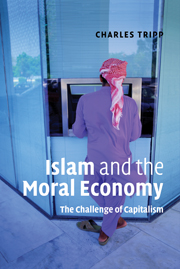Conclusion
Published online by Cambridge University Press: 08 January 2010
Summary
In reflecting upon the way in which Muslim intellectuals have responded to the transformative power of capitalism during the past hundred or so years, it becomes clear that many of them were having to think in new categories. The changes they were experiencing demanded not simply a new vocabulary of description and analysis, but new ways of imagining the very world itself. In particular, the social world, in the sense of the variety of human relations, required new ways of thinking about boundaries in space, function and status, with all that this implied for identities and for human potential. In order to achieve this, those involved in the project drew upon a repertoire of seemingly analogous terms of reference from the rich tradition of Islamic jurisprudence and ethics. This constituted the alphabet of appropriation, providing a readily understood and ethically acceptable resource that could be used selectively to meet the challenges of the age. In doing so, it also provided the settings of a moral compass that could guide the believer in ways that appeared consonant with his or her beliefs.
However, as became apparent in the century or so of voiced responses to the phenomenon of capitalist development and the globalisation of capitalist practice and power, this undertaking could neither be as self-sufficient nor as autonomous as some of its originators may have hoped. The terms deployed came with a dual legacy.
- Type
- Chapter
- Information
- Islam and the Moral EconomyThe Challenge of Capitalism, pp. 194 - 201Publisher: Cambridge University PressPrint publication year: 2006



